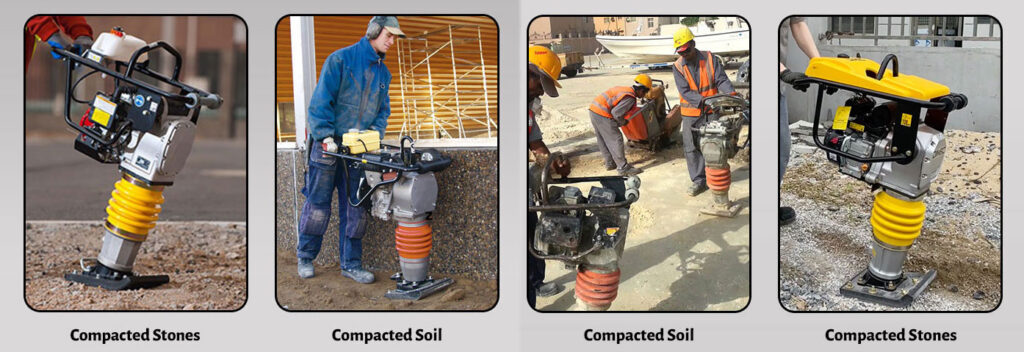The Ultimate Guide to Jumping Jack Compactors: Everything You Need to Know
- DIMEC
- Jumping Jack Compactor
- 16/01/2025
Home » The Ultimate Guide to Jumping Jack Compactors: Everything You Need to Know

Table of Contents
Introduction to Jumping Jack Compactors
Jumping Jack Compactors, often referred to as rammer compactors, are essential tools in the construction and landscaping industries. Designed to compact soil and other materials, these machines deliver powerful, high-impact force to create a solid and stable surface. First developed in the early 20th century, they have since evolved into sophisticated equipment that meets the demands of modern construction projects.
How Does a Jumping Jack Compactor Work?
Jumping Jack Compactors operate by using a piston-driven system that generates a rapid tamping motion. Key components include a heavy-duty engine, spring-loaded piston, and a durable plate. The science behind their effectiveness lies in their ability to apply high-frequency vibrations and impact forces that eliminate air pockets within the soil.
Applications of Jumping Jack Compactors
Construction Industry: Perfect for compacting trenches and foundations.
Landscaping and Gardening: Ideal for creating pathways and leveling soil.
Road Maintenance: Effective for repairing potholes and preparing roadbeds.
Types of Jumping Jack Compactors
Gasoline-Powered Models: Common and versatile.
Diesel-Powered Models: Known for their durability and fuel efficiency.
Electric Models: Eco-friendly and quieter alternatives for urban areas.
Key Features to Consider When Buying a Jumping Jack Compactor
When selecting a Jumping Jack Compactor, consider:
Engine Power: Determines efficiency and effectiveness.
Plate Size: Affects the area covered.
Compaction Depth: Ensures the desired level of soil stability.
Advantages of Using a Jumping Jack Compactor
Jumping Jack Compactors offer several benefits, including:
High efficiency and speed.
Exceptional durability, ensuring long-term use.
Reduced environmental impact due to improved fuel economy.
Limitations of Jumping Jack Compactors
Despite their advantages, these machines are not without limitations:
They are less effective for large-scale projects.
Size and weight can limit maneuverability.
Comparison: Jumping Jack Compactors vs. Plate Compactors
Key Differences: Jumping Jack Compactors excel in compacting cohesive soils, while plate compactors are better for granular materials.
Pros and Cons: Each type has its strengths depending on the project requirements.
Top Brands for Jumping Jack Compactors
Some leading brands include:
Wacker Neuson: Renowned for reliability and performance.
Toro: Offers innovative features and designs.
Multiquip: Known for heavy-duty applications.
Maintenance Tips for Jumping Jack Compactors
Ensure optimal performance with these maintenance tips:
Conduct routine inspections for wear and tear.
Clean the machine thoroughly after each use.
Address common issues such as engine trouble promptly.
Safety Tips for Operating a Jumping Jack Compactor
Follow these guidelines to ensure safety:
Handle the equipment with care and precision.
Wear appropriate protective gear, such as gloves and goggles.
Avoid overusing the machine to prevent operator fatigue.
Cost of Jumping Jack Compactors
Price Ranges: Typically between $1,500 and $3,500.
Renting vs. Buying: Renting is suitable for short-term use, while purchasing is better for frequent use.
Hidden Costs: Consider maintenance and fuel expenses.
Environmental Impact of Jumping Jack Compactors
Modern Jumping Jack Compactors are designed with environmental considerations in mind:
Improved fuel efficiency reduces emissions.
Lower noise levels make them suitable for residential areas.
Compliance with emission standards ensures minimal ecological impact.
Frequently Asked Questions About Jumping Jack Compactors
How much does a Jumping Jack Compactor weigh? Typically, they weigh between 60 and 80 kilograms.
Can it be used on wet soil? Yes, but performance may vary depending on soil conditions.
What is the average lifespan? With proper maintenance, these machines can last 5-10 years.
Conclusion
In summary, Jumping Jack Compactors are indispensable tools for creating stable and compact surfaces in a variety of applications. Their efficiency, reliability, and versatility make them a preferred choice for professionals in construction, landscaping, and beyond.
You May Also Like